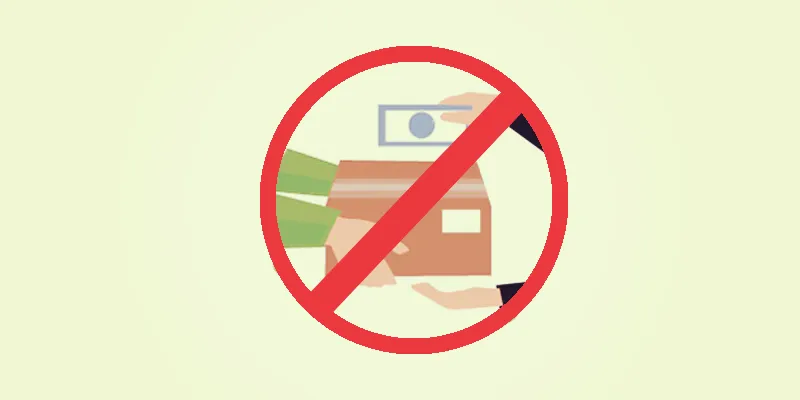Is the ban on currency notes the end of cash on delivery?
When Sanjay Sethi, the CEO and Co-founder of online marketplace ShopClues, first heard of the ban on the 500 and 1000 currency notes last night, he did not take it seriously. Around 10.30 pm, when the news was confirmed, ShopClues’ entire leadership team got on a frantic conference call to figure out the next steps.
The call, which lasted until past midnight, aimed to figure out solutions for immediate concern - what to do with the cash on delivery (COD) orders in transit. “We wondered whether we should put a threshold for CoD. We already have a cap of Rs 15000 for CoD orders [to ensure safety for courier partners]. We also had to talk to our logistics partners – we don’t have to worry if they can handle the cash. Tech also needed immediate attention as we needed to change delivery options for each item. We are not providing CoD for orders worth Rs 1000 and above,” says Sanjay.
Customers were notified by SMS this morning.

A compelling move
The government’s decision is to provide newly-designed currency notes which should be acquired by December 30, 2016. Experts believe this move will have a positive impact on the economy in the long term. However, in the short term, quite a few industries will be affected – e-commerce being one of them.
Anil Kumar, CEO, RedSeer Consulting, says that there are two types of customers opting to pay through COD – Type 1, who use COD mode because they are not very comfortable using electronic transactions at all. They may opt out of online shopping for the time being. Type 2 customers opt for COD out of choice. They are likely to shift to online modes of payment like card and wallet in the future, with online sellers providing incentives. “Overall, the share of Type 1 shoppers is not very high among the customer base, hence, we believe that the impact will not be on a very large scale in the short term,” he says.

Sanjay’s team at ShopClues has decided that if customers do not want to pay by cash, they can convert it to online payments. Sanjay says that their courier partners were already piloting a new system - delivery boys were trained to carry smartphones which enable customers to pay online at their door step. This service provides a better alternative to card-on-delivery service which only a few courier service providers give and in limited pin codes. Their coverage is poor in tier 2 and tier 3 cities, which provide about 70 percent of orders for ShopClues.
Curiously, online luxury goods platform Luxepolis has not seen cancellations as one would expect for the high value items at a time like this. But CEO Vijay KG says that people will probably stay away from buying high-value items for two months. “About 60 percent of customers prefer CoD. But this will now decrease. We provide card on delivery ourselves, very few others do that - but it is only about three percent in total.”
Curious timing
After October, which saw $2.25 billion GMV in online retail in India, customers may also take a pause in major online purchases. The next few days will see even less transactions as most customers are stranded without currencies of 100 denomination because ATMs and banks are closed right now.
However, this could be the beginning of something new in the e-commerce sector - CoD will dramatically fall.

Lizzie Chapman, Co-founder and CEO of online lending platform ZEST Money, says, “E-commerce companies will be subject to uncertainty due to a necessary reduction in CoD transactions, but in the long term, this will be a powerful move towards more efficient business models and unit economics. It is critical that e-commerce companies begin to offer alternative cashless payment options to their customers.”
Many e-commerce firms have stopped taking CoD orders for now. Amazon India’s website informs: “We've temporarily disabled cash on delivery (COD) for you to save cash for essential payments. Use your credit/debit cards, net banking and gift cards to complete your purchase.”
Food-tech startup Freshmenu is not accepting currency other than Rs 100 or below. Online grocery seller BigBasket has notified its customers that they will not be accepting Rs 500 and Rs 1000 notes. BigBasket gets 50 percent online payments usually. “For these two days, we are expecting 70-75 percent transactions to be online. We get hardly 1.5 percent returns, so there is no loss,” Co-founder and CEO Hari Menon told YourStory.
Flipkart has also stated that they are no longer accepting CoD payments in Rs 500 and Rs 1000 currency notes. Flipkart spokesperson said in an email interaction: “To enable customers to conserve smaller denomination notes for daily essential use, we are restricting CoD on orders below Rs 1000. Meanwhile, we urge our customers to opt for alternative payment modes such as card on delivery, internet banking, credit and debit cards, gift cards, and our easy and convenient PhonePe wallet."
Recent data from the Reserve Bank of India states that transactions via digital wallets in 2015 have grown to 153 million in October and December, compared to 65.9 million in the same period in 2014. Lizzie believes that adoption of cashless payment options will improve customer experience, reduce logistics pain and normalise unit economics for the entire industry.
Slow but strong steps
Cash is not disappearing yet. The government is just converting old series into new to bring out all the stashed up cash. The next three months will see a handful of categories being impacted: expensive holidays, dining at posh restaurants, alcohol, high value fashion, and used cars etc. for which black money is spent lavishly.
Arvind Singhal, Chairman of consultant firm Technopak, believes that e-commerce will be impacted only for a few weeks till people get new currency notes. “CoD will be lower till then. But for black money hoarders, e-commerce is not going to be very useful anyway. Online orders note delivery address, so you can’t convert black money to white there,” he says.
The 500 and 1000 denomination notes can be exchanged at RBI offices, banks, and post offices. Up to Rs 4000 is given in cash and any amount above that will be credited to bank account. Friday onwards, you can withdraw upto Rs 2,000 per day from ATMs until November 18. The limit will be raised to Rs 4000 per day from November 19.
Till then, the regular customer has to look for options which are provided by fintech players like Paytm. In fact, Paytm has seen 435 percent increase in overall traffic since the announcement came. Paytm wallets can also be used to transact offline.
Minimising the hurdles
To bring down CoD transactions, e-commerce players often provide incentives like free delivery for prepaid orders. ShopClues usually offers two percent in cash back schemes. For the items which are already in transit, they are offering up to 20 percent in loyalty programmes for certain categories.
To avoid cancellations, online fashion marketplace Voonik is doing some deliveries after November 24. “For CoD orders, we will give automated calls to pay by online transactions, credit card, and wallets for incentives, to switch to prepaid options. This should give a push to delivery partners who don’t give card-on-delivery option,” says Sujayath Ali, Co-founder and CEO of Voonik.

ShopClues, however, is taking a different route. According to Sanjay, “Instead of postponing deliveries, we keep the ordered items in the nearest warehouse for a couple of days, so that it can be delivered once the customer has enough cash to pay.”
Conclusion
Awareness is the first step towards mass adoption of any new idea. Although a behavioural change among online shoppers is too much to ask, this trend will spread awareness on the advantages of online payment. Arvind believes that the next few weeks will eventually lead to faster penetration of credit cards and faster growth of mobile wallets. “People will understand that they need not always keep a lot of currency, and will get comfortable carrying a credit card,” he says.
The currency ban has come as a jolt to not just black money hoarders but also to those who are not familiar with online payments. May be this is a wakeup call, which will eventually be a blessing to e-commerce companies who otherwise have to pay logistics surcharges of around Rs 40 per delivery for CoD orders.
India is one of the few markets where e-commerce is conducted more through CoD than online payments. China’s booming e-commerce is ruled by Alibaba’s payment wallet Alipay and Tencent's WeChat Payment. But CoD declined in China only when mobile wallets started offering interests. The money in an Indian mobile wallet is just idle today.
We still have light years to go before becoming a cashless economy – we need better internet, more smartphone penetration, and easier access to credit cards and digital wallets. But the ban on currency notes is definitely a step in the right direction.







